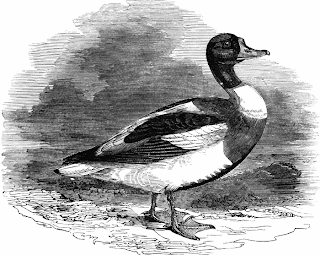The Rogues' Holiday:
A rooster and a hen decided to take a trip into the country to hunt for nuts. They came across a pile, but as they were eating and gathering them, a duck came along and accused them of stealing her winter stash. The rooster and the duck fought, and the duck lost. As punishment, the rooster hooked the duck up to a cart made of nut shells and forced her to pull the couple back home. Along the way, they encountered a pin and a needle who were traveling on foot. The pin and needle asked to ride along, and as they were small the rooster and hen allowed it. (The duck, obviously, had no say in the matter.) Because of the duck's short legs, the group only made it as far as an inn before it became too dark. Though they had no money, the rooster convinced the innkeeper that he could have an egg from the hen and from the duck in the morning for his breakfast. Early the next morning though, the rooster and the hen made a breakfast of the hen's egg, moved the sleeping needle and pin to the innkeeper's chair and towel, and flew out the window home. The duck, awoken by their flight, found a stream and swam back home, and the innkeeper was stabbed by pin and scratched by the needle when he went to sit down and then wash his face. The story ends with the important, if somewhat common thought of, "then [the innkeeper] took an oath that he would never again admit such knaves into his house -- ragamuffins who ate a great deal, paid nothing, and above all, instead of thanks, performed knavish tricks."
 Slightly less cruel is the story of The Troublesome Visitors.
Slightly less cruel is the story of The Troublesome Visitors.The Troublesome Visitors:
In this story, a rooster and a hen decide to visit their old master, Dr. Korbes. They build a cart and hook up 4 mice to it and begin their journey. Along the way, the encounter and pick up a cat, a millstone, an egg, a duck, a needle, and a pin. The arrive at Dr. Korbes house and find that he is not at home, however that does not stop them from making themselves comfortable. The rooster and hen nested on a perch, the cat crawled into the fireplace, the duck wattled out to a stream, the egg rolled up in a towel, the needled sat (point upward) in a chair, the pin jumped into the bed, and the millstone sat over the entrance door. When Dr. Korbes came home at night, the cat threw ash in his face as he tried to light a fire, the duck splashed him with water from the stream as he tried to get the ash out of his eyes, the egg broke on his face and glued his eyes shut as he tried to wipe off the water, the needle pricked him, the pin scratched him, and the millstone dropped on his head and killed him when he tried to leave. The rooster and hen were nowhere to be seen during Dr. Korbes' last hours. The story ended with, "this Dr. Korbes must really have been a very wicked, or a very injured man."
 The Rogues' Holiday is also listed as The Pack of Ragamuffins in other books. The Aarne Thompson classifcation code for these stories is AT 210. I need to learn more about Aarne Thompson. Yay, more research!
The Rogues' Holiday is also listed as The Pack of Ragamuffins in other books. The Aarne Thompson classifcation code for these stories is AT 210. I need to learn more about Aarne Thompson. Yay, more research!


